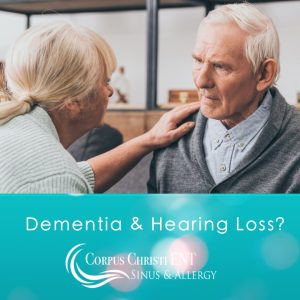
For years we have been told that reading, playing logic games, doing puzzles, and being active in society will help keep our brains healthy. It turns out that now being an active listener may also help. There is increasing evidence that there may be a link between Dementia and untreated hearing loss. Not that the hearing loss causes dementia, but that if individuals with hearing loss seek out help and wear hearing aids when appropriate, it can slow the rate of progression of the Dementia and keep your loved ones involved in the world longer.
Studies have shown that cognitive ability declines as hearing declines and the reverse is true as well, hearing declines as cognition declines.
We also know that listening is more challenging for people who perform less well on cognitive tests and they do even less well in noisy backgrounds. Unfortunately, some of the more difficult auditory tests may actually end up testing cognitive function instead of hearing. When we make the tasks more difficult in order to assess auditory processing it can be too much for a brain that has declined in function. Adding background noise, or altering the speech signal in some way to see how well an individual performs is hard enough for individuals without cognitive decline. If we add a cognition problem and Hearing loss is often called an invisible disease, because you can’t tell just by looking at someone that they have a hearing loss. Hearing loss often occurs so gradually that on average it is 5 years before someone starts to notice difficulty and it can be another 10 years before they do anything about it. As family members, it will be important for us to have those important and delicate conversations with our loved ones.
Research out of the University of Melbourne has demonstrated that adults over the age of 62 who were fitted with hearing aids for at least 18 months showed significant improvement in speech perception, feelings of listening disability, and overall quality of life. They measured participant’s cognitive function, levels of hearing, speech perception, quality of life, physical activity, mood and health. Over 95% of the study participants showed improvements.
If we notice lapses in memory or signs of hearing loss we need to have those hard conversations. If you or a loved one is showing signs of hearing loss, call our office to schedule an appointment for a hearing test.